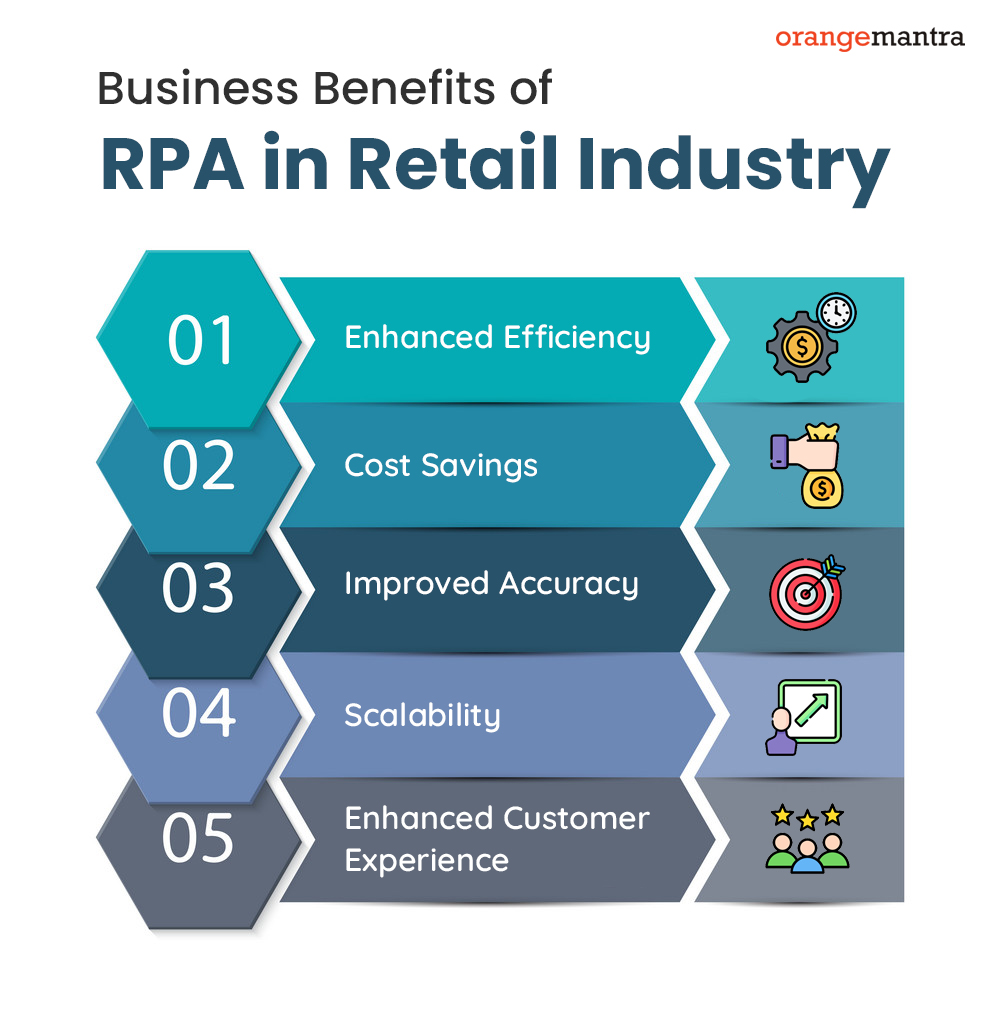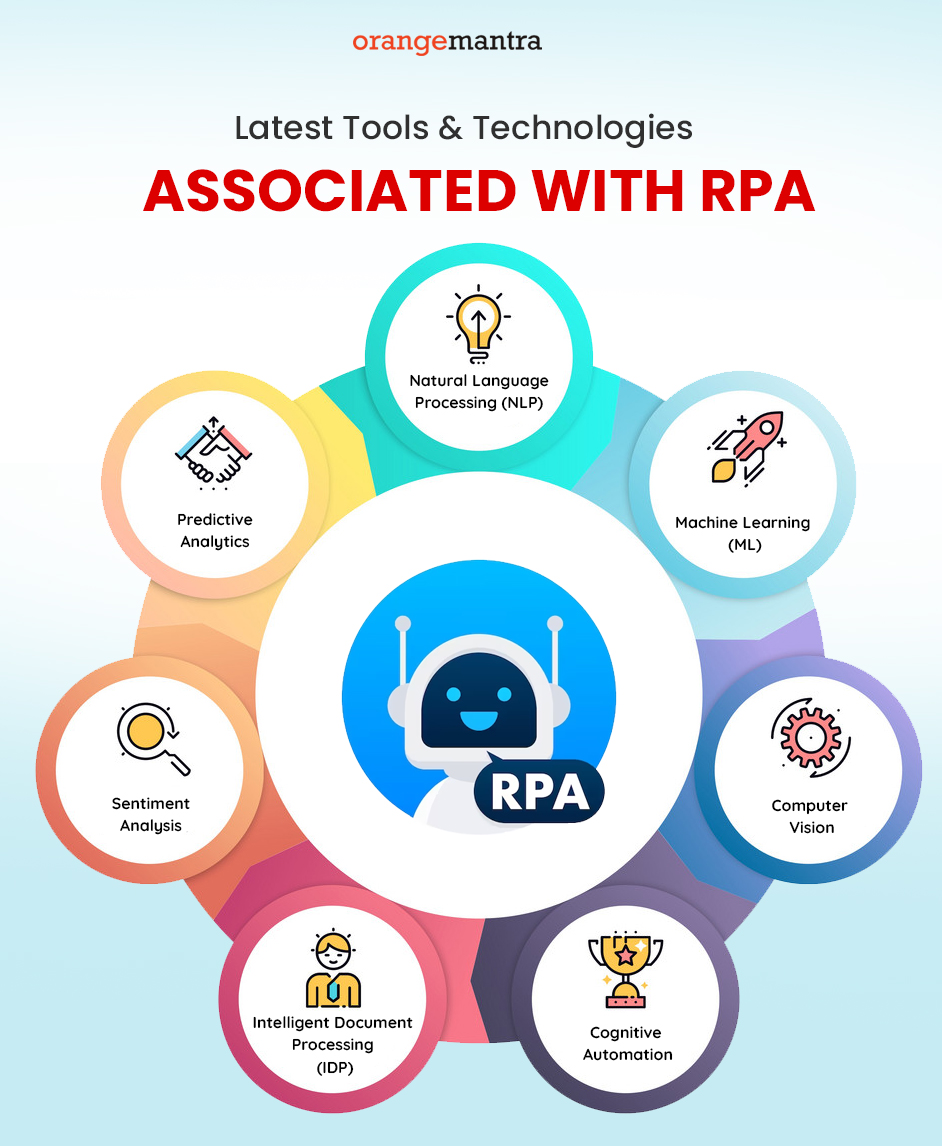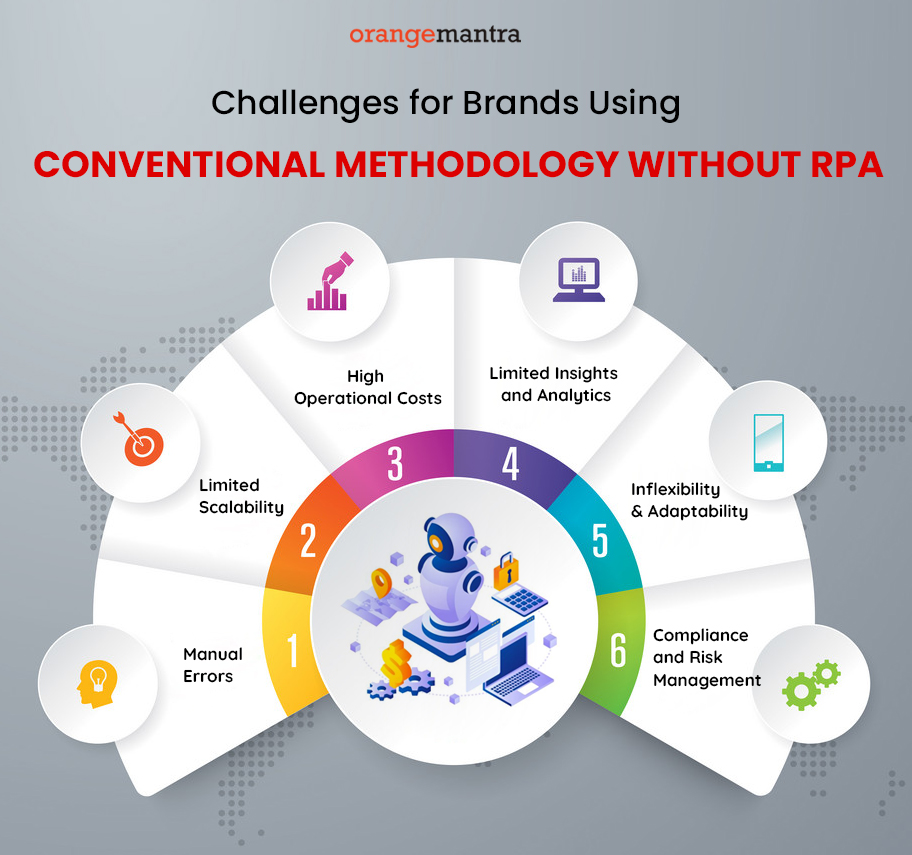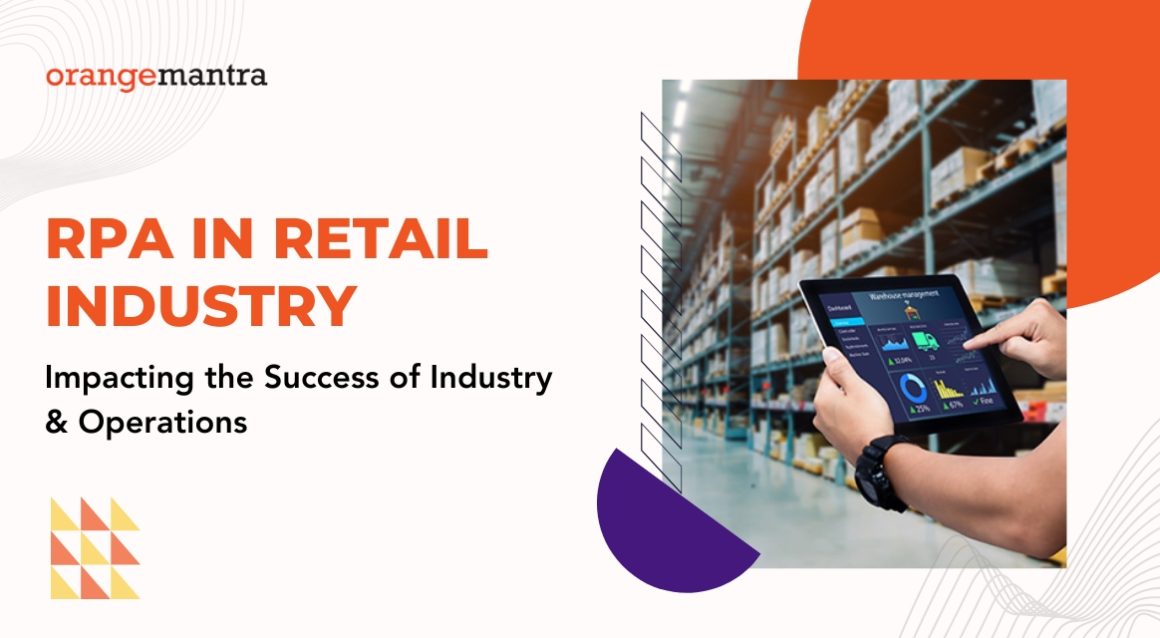Retail is a fast-paced industry having tight competition at every stage. Apart from offering quality products or services, it needs a proper balance of efficiency, agility, and innovation for growth. One of the major technologies transforming the retail industry is Robotic Process Automation (RPA). It is reshaping every aspect involved in business operations. Software robots power RPA to automate repetitive jobs that usually consume valuable resources. By eliminating these mundane tasks, retail brands can focus more on strategic initiatives, driving operational excellence for overall growth.
Consumers expect seamless and personalized experiences from retail brands. Bringing RPA in retail plays a pivotal role in optimizing various phases of the retail chain. You can easily manage inventory, orders, customer support, and more. Even RPA enables streamlined operations, boosts productivity, and delivers personalized experiences. By leveraging advanced technologies and automation, retail brands are keeping themselves ahead of the curve bringing the latest standards within operational efficiency.
Knowing more about the RPA in the retail industry helps you to extend beyond process automation. It guides you on how retail businesses can address operational challenges and bring opportunities for brand expansion. With RPA as an integral addition to digital transformation initiatives, retailers experience agility, scalability, and competitiveness in the digital age.
Business Benefits of RPA in Retail Industry
By harnessing the RPA for your retail, you can access numerous benefits, including operational efficiency and cost savings. As the retail industry faces stiff competition at every stage, RPA enables retailers to grow in an increasingly competitive and dynamic business world.

Enhanced Efficiency
- RPA automates routine tasks as well as accelerates them using Natural language processing solutions for your retail business. In addition, faster turnaround times and improved productivity are experienced.
- For instance, RPA can automate the inventory process by updating stock levels across different channels. With real-time update, you can lower the possibility of stockouts and overstocks.
- In addition, RPA addition to retail can streamline the order fulfillment process by automatically routing orders to the nearest warehouse. You can reduce delivery time by keeping a check on the logistics using RPA.
Cost Savings
- The advantage of RPA for cost-saving apart from reducing labor costs is simply exceptional. The elimination of operational inefficiencies and risks of human error is advantageous for brand growth.
- Bringing an intelligent warehouse management system helps to automate data entry and invoice processing. The chances of costly errors and discrepancies are reduced, saving both time and money.
- In addition, retailers can deploy their team in a more strategic and value-added process, growing ROI on the investments.
Improved Accuracy
- Inaccurate processes in retail operations cause multiple consequences, consisting of lost sales and customer relationships. RPA resolves this by offering greater precision and consistency within different processes.
- The major challenge for retail groups is to perform pricing and promotions management. Here, RPA can easily update prices across different channels and locations, lowering pricing errors in a jiffy.
- Regular reporting is majorly involved in the Retail world but using RPA development services can simplify regulatory reporting and even perform data validation and verification. You can lower the risk of non-compliance and other penalties.
Scalability
- One of the key business benefits of having RPA in retail is the scalability. It allows brands to adapt and expand their automation venture depending on the business growth.
- Whether you need to manage a major surge in order volumes or taking on new markets, RPA brings flexibility and scalability for seamless operations.
- Bringing automation within the repetitive tasks helps in making smart and strategic initiatives. You can perform product innovation, grow market, and ensure customer acquisition for competitiveness.
Enhanced Customer Experience
- In today’s competitive retail industry, delivering exceptional customer experiences is highly important. RPA can ease this process by enhancing the overall customer journey by making your backend processes automated and freeing up the front team or resources.
- When it comes to the example, you have seen how RPA-powered chatbots and virtual assistants can offer round-the-clock support, addressing customer inquiries in real-time.
- In addition, by process automation like order tracking and returns management, you have access to greater transparency and convenience. Ultimately you bring customer loyalty and advocacy.
Latest Tools & Technologies Associated with RPA
RPA in the retail industry is witnessing advancements in technology. By embracing these technologies and trends, retailers can unlock numerous benefits for innovation, and growth in the competitive landscape.

Natural Language Processing (NLP)
RPA systems are powered with NLP capabilities to diagnose the human language correctly for the smart decision-making process. It helps retailers to automate tasks involving unstructured data from different sources including emails, social media, and reviews. Having Natural language processing solutions can help to interact with customers in natural language. This provides personalized assistance and addresses queries in quick intervals.
Machine Learning (ML)
ML algorithms power RPA systems to make smart and business-oriented decisions by learning from data, studying patterns, and adapting to changing conditions. You can consult a professional digital transformation company to build solutions for your retail operations. Automation of decision-making processes needs deep analysis of large datasets and prediction of future elements. For example, ML assists in optimization of the pricing strategies, and product recommendations based on customer requirements, and detects suspicious transactions.
Computer Vision
Another technology in the list is computer vision technology helping RPA systems to interpret and analyze visual information. This is a perfect addition for retailers to automate tasks including product recognition, quality checks, and overall inventory management. RPA-powered robots having computer vision can simply monitor product availability, identify misplaced products, and add stocks in real-time.
Cognitive Automation
RPA with advanced cognitive technologies like AI Development, NLP, and ML helps retail brands to automate complex jobs. The major ones include understanding and processing data from diverse resources. Unlike conventional RPA processes, depending on rules-based automation, this technology enables software robots to analyze and respond to natural language inputs. This is helpful with contextual decisions, and knowing experience.
Intelligent Document Processing (IDP)
Cognitive automation solutions employ AI and ML algorithms to gather information from unstructured documents. It majorly includes invoices, contracts, and receipts which are complex to manage. Bringing automation for document processing helps retailers to streamline operations, lower manual issues, and accelerate decision-making activities. Having RPA-powered IDP systems is a game changer for the extraction of relevant data from different orders, and inventory records, and simplification of the payment process.
Sentiment Analysis
RPA integrated with sentiment analysis capabilities is useful for analysis of the textual data. It could be sourced from customer reviews, social channels, and more to monitor customer sentiment and recognize emerging trends. Automation of sentiment analysis during the eCommerce software development enables retailers to reap insights from customer preferences, and opinions. With all this information you can tailor products, services, and marketing campaigns to engage target audiences and meet diverse expectations.
Predictive Analytics
Leveraging predictive analytics algorithms for RPA solutions helps to keep a check on historical data, and patterns, and even forecast future trends. Merging automation with predictive analytics processes brings opportunities for retailers to predict customer demand, optimize inventory stocks, and even personalize marketing strategies. For example, RPA with predictive analytics can forecast sales, suggest promotional offers, and even build pricing strategies by assessing market conditions and customer behavior.
Challenges for Brands Using Conventional Methodology without RPA
By knowing these challenges, retailers can keep a check on the limitations of conventional methodologies. Moreover, they can integrate RPA solutions to overcome these obstacles for competitive edge in retail industry.

Manual Errors
Manual work within inventory management, order processing, and customer service results in slow processes, sluggish performance, reduced productivity, and human errors. You will come across data entry mistakes, miscommunications, and oversight. In the end, it leads to inaccuracies in inventory records, missed orders, and ultimately impacting customer loyalty. For instance, without smart retail solutions, you may experience discrepancies within the physical and digital channels ending in stockouts or overstocks.
Limited Scalability
Conventional methodologies result in limited scalability needed for fulfillment of the dynamic demands of retail operations, during the peak seasons. Manual processes based on human resources may experience sluggish performance, bottlenecks, inefficiencies, and operations delays. Manual processes become outdated when retailers expand their product offerings, geographic reach, or sales channels. At last, impacting the organization’s ability to make the most of the available growth opportunities.
High Operational Costs
Manually intensive activities involve high labor costs related to hiring, training, and managing repetitive jobs. Moreover, manual processes are less efficient when compared to automated processes. It even results in higher operational expenses and reduced profits. When doing manual operations, dedicated personnel is required to handle every step involved ranging from order to fulfillment. It increases labor costs, cycle times, and excess inventory holding costs. Being a retailer you might struggle to keep a check on the stock levels and prevent overstocking situations.
Limited Insights and Analytics
Conventional methodologies integrated into omnichannel eCommerce solutions often cause sluggish performance and delayed advanced analytics capabilities. No actionable insights are available to monitor data generated from different departments in the retail business. Without the presence of automation in data collection and analysis, retailers experience trouble identifying trends, patterns, and opportunities within the collected data. Reporting of manual sales processes within omnichannel eCommerce solutions ends in delayed or incomplete data analysis. It makes it difficulty for retailers to build pricing strategies to cater to diverse forecast demand.
Inflexibility and Adaptability
Conventional techniques are often rigid and inflexible, causing troubles for retailers in sync with changing market dynamics, consumer demands, and regulatory requirements. Manual processes follow static workflows and procedures. Thus lack the agility needed to respond quickly to unforeseen events. Without automation in place, you as a retailer may face difficulty in implementing changes or updates within the operations, ending in missed opportunities.
Compliance and Risk Management
Manual techniques may end in challenges like regulatory compliance and troubles with risk management. Manual processes performed for compliance monitoring, audit trails, and risk assessment cause errors, missed opportunities, or non-compliance. This exposes retailers to potential legal or financial complexities. Without bringing compliance management systems, retail brands may face difficulty in keeping pace with changing regulations and setting industry standards, putting businesses at risk of facing fines, and penalties.
Wrapping Up
In 2024, the retail industry is experiencing major disruption and transformation powered by RPA. In the dynamic landscape, to beat the competition and innovate, consulting a Digital Transformation company is a necessity. Robotic Process Automation (RPA) is a major addition to thrive in the digital era of omnichannel eCommerce. You can streamline business operations, boost efficiency, and gain a competitive advantage.
RPA streamlines and automates mundane jobs across multiple channels, including online stores, mobile apps, social media platforms, and brick-and-mortar stores. Whether you want order processing, inventory management, customer service, or marketing, RPA is a major addition.
If you are looking for professional RPA development services, OrangeMantra can be your perfect IT partner. They have years of expertise in eCommerce store development for serving your diverse business needs. Moreover, they can suggest the latest technologies and tools to perform quality integration. Embracing RPA is not just a choice for retailers; it’s a necessity that will redefine the future of retail in the digital world.
Frequently Asked Questions
How OrangeManta ensure seamless integration of RPA in retail industry?
At OrangeMantra, a systematic approach to RPA solutions seamless integration with your retail solution is implemented. We start with a comprehensive assessment of your current system to identify possible integration points and challenges. A proper strategy is defined based on this analysis for meeting your business objectives and eliminating disruptions. Our team of dedicated eCommerce developers conducts rigorous testing and validation for seamless integration with your systems and processes.
What approach is applied to ensure RPA is successfully implemented within existing system?
Our approach to ensuring RPA opportunities within your retail business begins with deep research, data analysis, and regular collaboration. We gain a deep understanding of your business activities, and challenges by conducting interviews, workshops, and documentation. The team of developers focuses on automation opportunities to reduce cost and enhance efficiency for customer satisfaction. We work closely with our client to refine automation requirements and build a proper roadmap to implement RPA solutions.
How OrangeMantra ensure security during RPA implementation in retail industry?
OrangeMantra is a leading digital transformation company ensuring security and compliance are taken on a serious note. We follow industry-standard security measures and protocols for keeping the confidentiality, and integrity, of the data during RPA development services. We ensure compliance with the latest regulations including GDPR, HIPAA, and PCI DSS, by including compliance needs. Every factor is prioritized for the design, development, and deployment of RPA solutions. Just share your requirements and we ensure peace of mind for your RPA integration meeting regulatory standards.
What is the cost and timeline involved in RPA development services?
The timeline and cost of offering RPA development services can vary depending on several factors. The major ones to consider are process complexity, automation scope, multiple integrations, and customization required. Our process is transparent and collaborative to ensure timely estimation and planning. We assess your requirements and objectives for building a proper plan. Next, a comprehensive proposal is provided providing a timeline, milestones, and cost estimates. Throughout the RPA development services, we are open to communication and continuous updates to ensure the project is delivered within budget.
What scalability and flexibility do your RPA solution offer for business growth?
Every retail business has a unique set of requirements. Our RPA solutions can be tailored to offer advanced scalability and flexibility for meeting future predictions and changes. We build solutions with scalability, advanced technologies, and scalable infrastructure for addressing the surge in workload. Additionally, RPA solutions are flexible and adaptable to serve business needs. Our goal is to provide RPA development services that are agile, and resilient, keeping you ahead of competitors.























